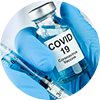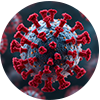
With the advent of SARS in 2003 and later MERS in 2012, these coronavirus diseases have become a challenge for research teams involved in the development of viral vaccines at some universities or laboratories of pharmaceutical companies' research centers.
We currently divide vaccines according to the platform used - the technological solution into:
Recently, live attenuated vaccines have been phased out due to certain risks associated with the biosafety of these vaccines. They were usually the source of more frequent side effects, but their advantage was, on the other hand, long-lasting immunity. Modern methods of genetic engineering make it possible to design vaccines for new generations; these are precisely genetic vaccines or vaccines based on viral vectors or recombinant viral proteins - surface antigens.
It is currently in clinical trials according to the data The New York Times a total of 44 COVID-19 vaccines. Of these, 11 are in III. phase of clinical trials and 5 have already obtained state approval in Russia and China without completing clinical trials.
Closest to the finish line and at the end of III. The testing phase is a vaccine being developed by AstraZeneca together with Oxford University. It is a vector vaccine using simian adenovirus as a vector to produce a recombinant chimera with the gene encoding the SARS-CoV-2 coronavirus surface glycoprotein S. The team is followed by a genetic vaccine developed by a consortium of the German company BioNTech, the American company Pfizer and the Chinese company Fosun Pharma. They prepared a genetic vaccine for mRNA (information RNA corresponding to coronavirus RNA), which stimulates not only specific antibodies against COVID-19 in vaccinated persons, but also significantly cellular immunity (T cells) against coronavirus. A genetic vaccine of the same type is also being developed by the American company Moderna in collaboration with the US National Institutes of Health (NIH); III. the phase of clinical trials on 30,000 volunteers began at the end of July. And III. The vaccine phase is also a vaccine of the American company Johnson & Johnson, developed together with Israeli researchers. Like the Russian Sputnik 5 vaccine, it is based on human adenovirus as a vector for the introduction of a gene encoding the coronavirus surface antigen S into a vaccinated organism.
In the Czech Republic, the procedure of clinical testing of a protein vaccine of the Novavax company, which has one of its production plants in Bohumil near Kostelec nad Černými lesy, is interesting. The vaccine is based on the envelope glycoprotein S from the surface of coronavirus, which is produced as a recombinant protein in butterfly cells infected with insect baculovirus, which has a gene encoding the coronavirus surface glycoprotein S incorporated into its genome. III. the clinical trials phase should be completed by March 2021 at the latest.
From ongoing clinical trials of vaccines, or leaks, it appears promising that the formation of specific antibodies, including coronavirus neutralizing antibodies, has been reported with these vaccines. Cellular immunity (T cells) is also stimulated as needed, especially if the vaccine can be delivered to the lymph nodes - then the stimulatory effect for cellular immunity is orders of magnitude higher. The results of the first clinical trials of the Russian Sputnik 5 vaccine on 76 volunteers ˗ soldiers were published in a prestigious journal The Lancet. The authors document a high antibody response against their vector vaccine based on two types of human adenoviruses.
It will certainly improve the vaccines developed both in terms of the antigenic properties of the vaccine and in terms of its formulation with adjuvant components to stimulate the immune response of the vaccinated organism. An important characteristic of the vaccine is also its stability, which determines its expiration time. The most unstable vaccines are those that can be stored and distributed in dried (lyophilized) form and stored as standard at +4 ° C. Mutations in the virus can significantly reduce the effectiveness of the vaccine over time. Like antivirals, vaccines can induce the production of antigenic variants (subtypes) in human society of the circulating wild-type virus. Among other things, precisely because of the reduced likelihood of such resistant variants, it is important to have more functional vaccines on the market, targeting more antigenic centers of the virus. In the case of SARS-CoV-2 coronavirus, this means acting at multiple sites in the structure of the surface (protruding) S antigen, not just the Achilles' heel of the coronavirus in glycoprotein S (the ACE-2 receptor portion of the infected host cell).
Loosely based on the interview of prof. Libor Grubhoffer, director of the Biological Center of the ASCR, on the portal prolekarniky.cz
PharmDr. Michal Janů, Ph.D.

30. 11. 2025
The pitfalls of mail order dispensingAt the recent XXXIVth congress of delegates of the Czech Chamber of Pharmacists, the discussion about the possibility of introducing mail order dispensing was reopened ...

31. 10. 2025
Hepatitis A (viral hepatitis A) is an infectious inflammatory liver disease caused by the hepatitis A virus. It is transmitted by the fecal-oral route either by ...